English Words in Action, Group T
(a variety of English words which have developed through history and are currently used in our modern age)
Simply click on this banner (or the following link) and you will be on your way to stimulate your brain for greater word comprehension with quizzes based on some of the words in this unit.
throne (verb), thrones; throned; throning
To install in or to occupy a position of royal authority: Elizabeth Alexandra Mary, or Queen Elizabeth II, was throned in 1953 after her father George VI died in 1952.
1. Divination or prophecy performed by means of one's own soul: The desert hermit practiced thumomancy and chose to meet with petitioners once per year.
2. Etymology: thumo- comes from Greek thumos, "soul" and mancy, "divination, prophecy, fortune telling" is also from Greek.
2. Etymology: thumo- comes from Greek thumos, "soul" and mancy, "divination, prophecy, fortune telling" is also from Greek.
thwart (THWORT) (verb), thwarts; thwarted; thwarting
1. To prevent, to interfere, or to hinder: The severe storm thwarted Victor's plans to drive home from the university for the holidays.
2. To foil, to ruin, to stop, or to prevent: The loss of Harry's job thwarted his plans to buy the car that he wanted.
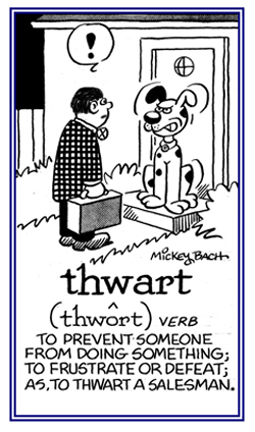
© ALL rights are reserved.
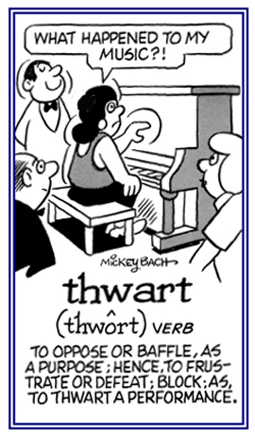
© ALL rights are reserved.
Go to this Word A Day Revisited Index
2. To foil, to ruin, to stop, or to prevent: The loss of Harry's job thwarted his plans to buy the car that he wanted.


Go to this Word A Day Revisited Index
so you can see more of Mickey Bach's cartoons.
1. A teasing stroke or a tingling rub: The little girl laughed when her father gave her a tickle.
2. An uncomfortable itch or a twitching sensation: A cough drop can help to ease that tickle in the throat.
2. An uncomfortable itch or a twitching sensation: A cough drop can help to ease that tickle in the throat.
tickle (verb), tickles; tickled; tickling
1. To make someone laugh by lightly touching a sensitive part of the body with the fingers, a feather, etc.: The mother tickled her baby under the chin.
2. To have or to cause a slightly uncomfortable feeling on a part of the body: When Mark wore the sweater, the tag in the back of neck area tickled his neck.
3. To please or to amuse someone: The comedian tickled the crowd with his jokes.
2. To have or to cause a slightly uncomfortable feeling on a part of the body: When Mark wore the sweater, the tag in the back of neck area tickled his neck.
3. To please or to amuse someone: The comedian tickled the crowd with his jokes.
The puppy's playing around tickled the family.
tickle your fancy (verb), tickles your fancy; tickled your fancy; tickling your fancy
That which interests or attracts someone: Mary asked, "Do either of these trips tickle your fancy?"
ticklish (adjective), more ticklish, most ticklish
1. Sensitive to tingling or easily reactive to a light touch: Marge admitted that she was a ticklish person.
2. A reference to being delicate, complicated, awkward, requiring tact, etc.: Bringing the two enemies together will be a ticklish procedure.
2. A reference to being delicate, complicated, awkward, requiring tact, etc.: Bringing the two enemies together will be a ticklish procedure.
tie a can to (verb), ties a can to; tied a can to; tying a can to
1. To get rid of someone or something, to dismiss. to reject, to discharge: A woman tied a can to her boyfriend apparently because she didn't want him anymore.
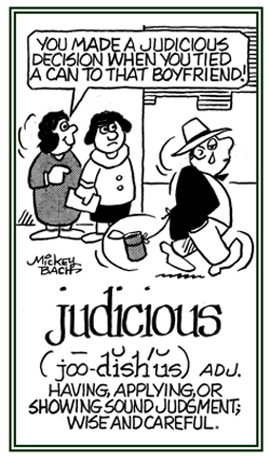
© ALL rights are reserved.
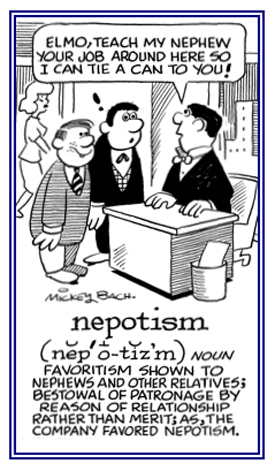
© ALL rights are reserved.
Go to this Word A Day Revisited Index
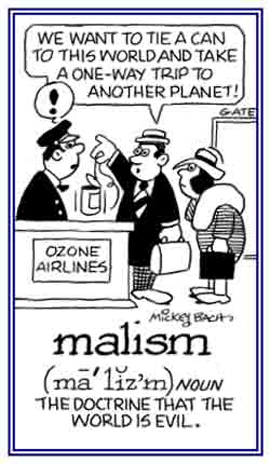
© ALL rights are reserved.
Go to this Word A Day Revisited Index
2. To control or to stop an activity: A woman said that her husband was deceiving himself if he thinks he can tie a can to her.
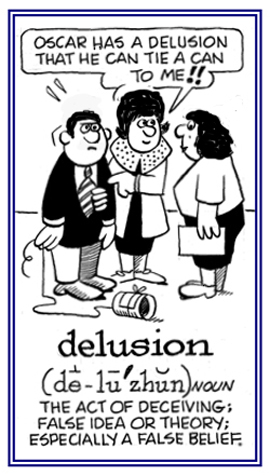
© ALL rights are reserved.
Go to this Word A Day Revisited Index
3. To control someone or to make him or her do something: Another wife wants her husband to buy her a coat or she will tie a can to him in order to make him do what she wants him to and he is apparently not concerned about her threat.
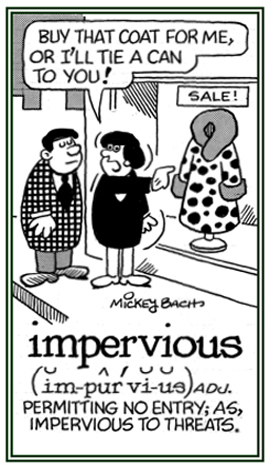
© ALL rights are reserved.
Go to this Word A Day Revisited Index
Anyone who has had a can tied to him or her is a person whose presence is no longer desired.


Go to this Word A Day Revisited Index
so you can see more of Mickey Bach's cartoons.
Something that is no longer wanted nor appreciated.

Go to this Word A Day Revisited Index
so you can see more of Mickey Bach's cartoons.
2. To control or to stop an activity: A woman said that her husband was deceiving himself if he thinks he can tie a can to her.

Go to this Word A Day Revisited Index
so you can see more of Mickey Bach's cartoons.
3. To control someone or to make him or her do something: Another wife wants her husband to buy her a coat or she will tie a can to him in order to make him do what she wants him to and he is apparently not concerned about her threat.

Go to this Word A Day Revisited Index
so you can see more of Mickey Bach's cartoons.
1. A linear projection of when events occur from the past, the present, or are projected into the future: Government officials have hopes that in time the political resolution of problems among nations will occur instead of resorting to military solutions.
2. A lapse between the occurrences of events: Norbert passed the time waiting for the bus to arrive by reading and chatting with others who were waiting with him.
3. A manner, typically involving numbers that indicate when an event, etc. took place or may have taken place: Jane asked, "Jim, how much time has passed since we last got together?"
4. The indication of a period or interval of surrounding events: The past five years have been hard times for the factory.
5. An indication of when prevailing events or trends occur: By hiring a woman CEO, the organization was certainly in tune with the times.
6. Specific seasons or opportunities for events that take place: The village was celebrating harvest time by having a fair.
7. The occasion or opportunity in which to complete an activity: Mother said, "Mildred, there will be plenty of time to finish your homework."
8. An instance or specific occasion in which something happens: The time of little Glenda's birth was midnight on New Year’s Eve.
2. A lapse between the occurrences of events: Norbert passed the time waiting for the bus to arrive by reading and chatting with others who were waiting with him.
3. A manner, typically involving numbers that indicate when an event, etc. took place or may have taken place: Jane asked, "Jim, how much time has passed since we last got together?"
4. The indication of a period or interval of surrounding events: The past five years have been hard times for the factory.
5. An indication of when prevailing events or trends occur: By hiring a woman CEO, the organization was certainly in tune with the times.
6. Specific seasons or opportunities for events that take place: The village was celebrating harvest time by having a fair.
7. The occasion or opportunity in which to complete an activity: Mother said, "Mildred, there will be plenty of time to finish your homework."
8. An instance or specific occasion in which something happens: The time of little Glenda's birth was midnight on New Year’s Eve.
time (verb), times; timed; timing
1. To choose an hour, a day, a month, a year, etc. when something is to happen at an indicated schedule: Matthew timed his trip to coincide with the summer vacation at his university.
2.To make something happen at a certain minute: The senator timed his speech to take place just before the congressional recess was to take place for the summer.
2.To make something happen at a certain minute: The senator timed his speech to take place just before the congressional recess was to take place for the summer.
1. A small trace or amount of color that is added to something: The wallpaper in Jim's bedroom has a tinge of orange.
2. A slightly added property, element, or influence: The book Helga was reading had a tinge of unpleasantness for the main characters.
2. A slightly added property, element, or influence: The book Helga was reading had a tinge of unpleasantness for the main characters.
tinge (verb), tinges; tinged; tingeing, tinging
1. To add a trace of color to something: Sam tinged the glass of water blue with just one drop of ink.
2. To slightly affect something: The environment was tinged with a contrasting content including a breezy wind that was being tinged with rain.
2. To slightly affect something: The environment was tinged with a contrasting content including a breezy wind that was being tinged with rain.
1. A prolonged declamatory outpouring, as of censure; a long angry speech or lecture: The talk-show hosts are known to continually deliver tirades against their political opponents.
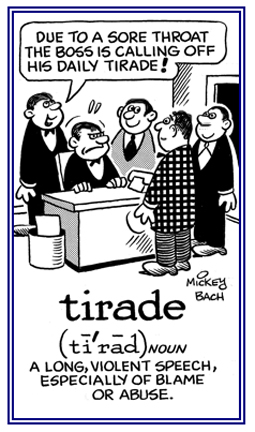
© ALL rights are reserved.
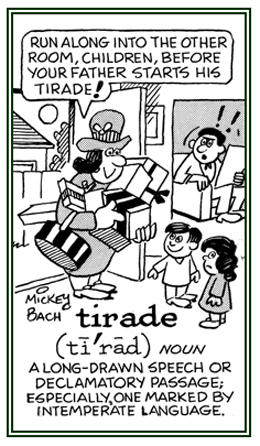
© ALL rights are reserved.
Go to this Word A Day Revisited Index
The office-seeker let loose a tirade of vilifications against his opponent.
2. Etymology: from Italian tirata, "volley, a discharge of firearms"; a tirade is "a volley of words", usually of censure or severe criticism.

Go to this Word A Day Revisited Index
so you can see more of Mickey Bach's cartoons.
tirade (verb), tirades; tiraded; tirading
To make a long and angry speech that includes condemnation, reprimanding, and scolding: The new candidate for mayor was tirading about the current mayor as a failure.
The football coach tiraded the team for losing the game.
The principal of the high school was tirading a group of students for their misbehavior and disobedience.
The writer was pointing out that the critic can't tirade people for not being able to spell; especially, when he makes spelling errors himself.
tirading (adjective), more tirading, most tirading
References to statements or speeches that reprimand, scold, denounce, condemn, vilify, etc.: The tirading taggers were spray painting all over the city, but they were finally caught by the police.
Links to all of the groups of English words in action, Groups A to Z.
You may see the bibliographic list of sources of information for these words in action.


